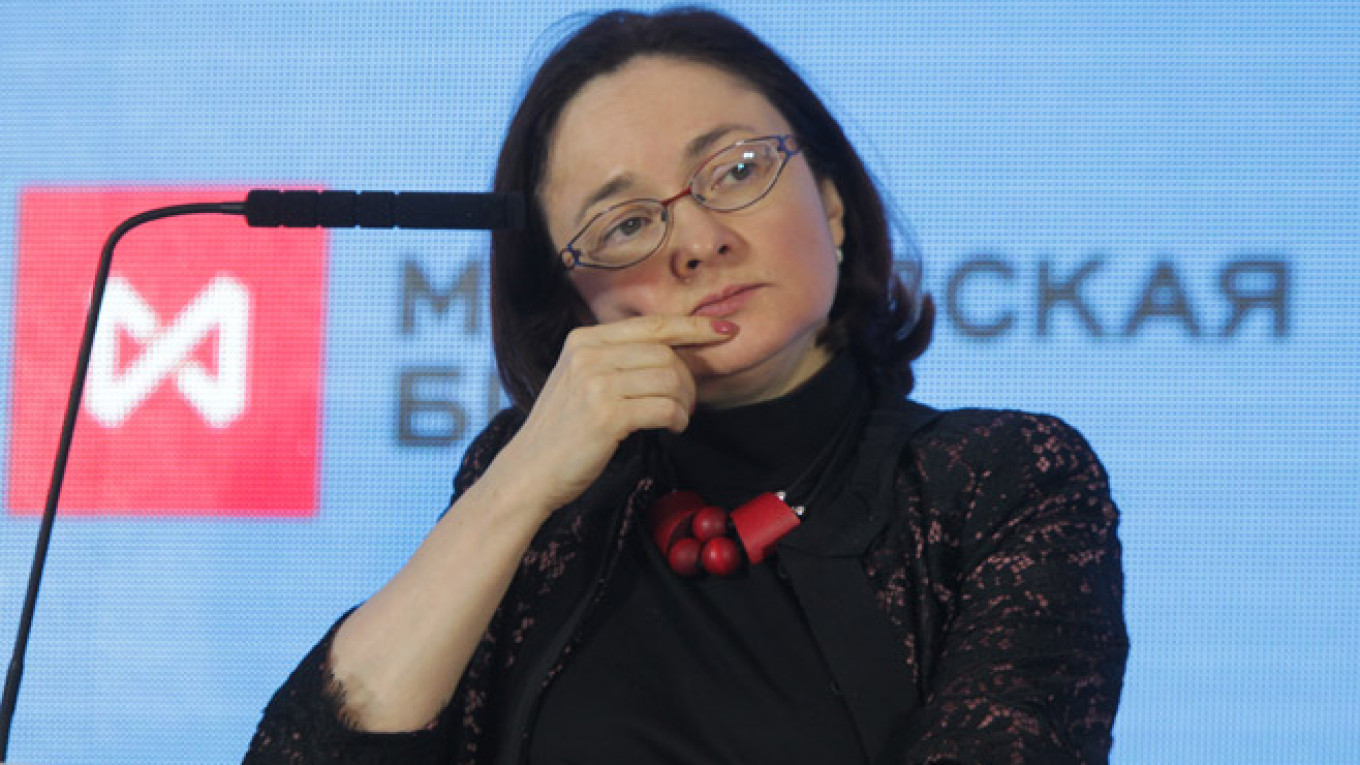The Russian economy is likely to grow by around 0.5 percent this year but the overall threat to stability from the crisis in Ukraine would not be "large-scale," Central Bank head Elvira Nabiullina said.
The Central Bank will probably revise its 2014 gross domestic product growth forecast to around 0.5 percent, Nabiullina told Reuters in an interview published Monday, revealing that it had earlier forecast a 0.9 percent expansion.
The economy is on the brink of recession after quarterly GDP fell by 0.5 percent in the first quarter, impacted by sanctions and instability resulting from the stand-off with Ukraine and wider emerging market uncertainty.
Nabiullina said it was too early to speak of a recession before full macroeconomic data for the second quarter is out, but she acknowledged that the economy has been affected.
"Sanctions and expectations of sanctions affect the Russian economy, but we cannot say that it is a large-scale impact," Nabiullina said.
The Central Bank's earlier GDP growth forecast of 0.9 percent had not been made public, which indicates two downward revisions have been made by the Central Bank since Russia engaged in Ukraine and annexed the Crimean peninsula.
In February, the Central Bank predicted the economy would grow by 1.5 to 1.8 percent in 2014.
For the next two years, the Central Bank sees growth of around 1.5 to 2 percent.
The U.S. and the European Union have imposed sanctions on a number of businesses and officials considered close to President Vladimir Putin.
Russian officials vary in their assessments of the impact on the country's economy, but former Finance Minister Alexei Kudrin said last week they may have cut GDP growth by 1 to 1.5 percent.
"Any argument about growth projections for this year is academic — there is no difference between zero growth, or 0.2 percent or 0.5 percent," Nabiullina said.
Based on Central Bank data, capital flight in the first four months of the year reached about $68 billion, exceeding the total for all of last year.
The central bank increased rates twice between March and April — by a cumulative 200 basis points to 7.5 percent — to stem the flow of funds and aid the ruble, but Nabiullina said the impact of the sanctions had been limited.
She added that the most obvious impact has been seen in business and individuals rushing to exchange rubles into foreign currencies, weakening the currency and increasing inflationary pressures.
The ruble, which in March was down 10 percent against the dollar compared to the start of the year, has since recovered and is trading at January levels. But the impact from its weakening early this year will continue for some time, Nabiullina said.
She said she expects annualized inflation of 7.5 percent by the end of the first half of the year, before easing to around 6 percent by the end of 2014.
The Central Bank is counting on a good domestic harvest and a good fruit and vegetables crop this year to soften pressures on consumer prices, as historically has been the case.
Nabiullina said she was also counting on greater stability on the currency market.
The Central Bank might reach its long-established 4-percent inflation target by the end of 2016, she said.
Sanctions have also limited access to foreign debt markets for Russian companies, resulting in higher domestic lending, but Nabiullina said companies would cope with the debt burden.
Lack of Investment
For the longer term, Russia needs more investment to ensure higher sustainable growth rates, she said.
"In order to bet on better growth rates we need a change in the dynamics of investment and structural reforms."
Investment by firms in tangible assets, once a major factor behind Russia's economic growth, has been falling, with April data showing a 2.7 percent drop year-on-year.
"Now the dynamics of investment are even more important than the current economic growth rate," Nabiullina said. "If we manage to break the negative trend and obtain a sustainable increase in investment, this will become the basis for long-term economic growth."
Nabiullina said a $400 billion 30-year gas supply contract which Moscow signed last week with Beijing was a help but more private investment would be needed in Russian manufacturing, and there, the political backdrop remains an issue.
"Investment is very sensitive to uncertainties," she said. "An increase in risks leads primarily to enterprises delaying their investment decisions."
A Message from The Moscow Times:
Dear readers,
We are facing unprecedented challenges. Russia's Prosecutor General's Office has designated The Moscow Times as an "undesirable" organization, criminalizing our work and putting our staff at risk of prosecution. This follows our earlier unjust labeling as a "foreign agent."
These actions are direct attempts to silence independent journalism in Russia. The authorities claim our work "discredits the decisions of the Russian leadership." We see things differently: we strive to provide accurate, unbiased reporting on Russia.
We, the journalists of The Moscow Times, refuse to be silenced. But to continue our work, we need your help.
Your support, no matter how small, makes a world of difference. If you can, please support us monthly starting from just $2. It's quick to set up, and every contribution makes a significant impact.
By supporting The Moscow Times, you're defending open, independent journalism in the face of repression. Thank you for standing with us.
Remind me later.






